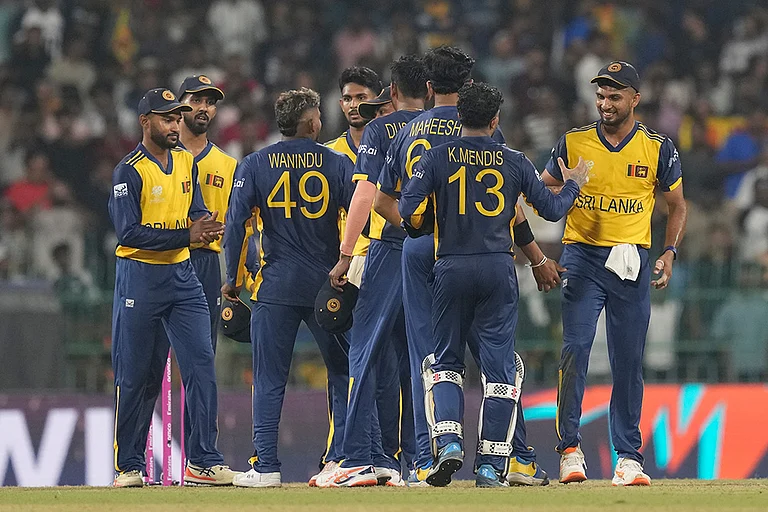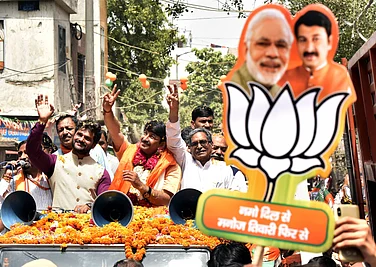"Jesus said to them, those enemies of mine who did not want me to be king over them, bring them here and kill them in front of me."
Luke, Chapter 19, verse 27
This is not an extract from Christian literature but from pamphlets brought out by anonymous fringe Hindu groups. "Conversion, slaughter, subjugation, rape are the tenets of Christianity," claims one such booklet and exhorts the faithful to take to arms. "Aryans have the right to slay anyone who's a danger to their lives. A war against Christianity has been initiated by Aryavarta. The criminals must vacate Bharatmata."
If it's indeed a war, it is an unequal one. The spate of anti-Christian violence that began in 1997 in tribal pockets in Gujarat and Orissa now erupts in random acts across India. In June alone, a priest was killed in Mathura, a pastor's body found in Punjab and five bomb blasts rocked churches in Andhra, Karnataka and Goa. The onset of summer has been particularly uncomfortable for the Christian community. Through April and May there have been over 20 instances of ransacking and desecration of churches, assaults on nuns and priests and an overall attempt to intimidate the community. Delhi Archbishop and Catholic Bishops Conference of India (cbci) chief Alan de Lastic, who left for the Vatican after leading a team of church figures to A.B. Vajpayee last week, told Outlook from Rome: "This is the gravest challenge our community has faced in the 53 years since independence. India has a glorious heritage but I worry about its future. Today, I'm ashamed to be an Indian."
Christians trace the violence against them to the BJP's ascent to power. John Dayal, national convenor of the United Christian Forum for Human Rights, says "the BJP and Sangh parivar are using Christian-bashing to consolidate the Hindu votebank". Reverend Donald de Souza, cbci deputy secretary, sees a sinister design: "The real targets are Muslims. But they know if they touch a mullah or desecrate a mosque there will be riots. Christians are a soft target. We never respond with violence. And today an atmosphere has been created where people who attack us know they can get away with murder." De Lastic points to what he calls a "political strategy" behind the pattern of violence. "I knew things would be relatively peaceful before Clinton's visit and they were. And things always improve when Parliament is on. This time too, the worst incidents came after the session."
All this would imply a sinister conspiracy against the tiny community. Have a handful of pracharaks gathered at Nagpur and ordered the missionaries' annihilation? Is it a well-orchestrated campaign? And are these elements being shielded by the state? The Sangh establishment has responded by blaming the recent blasts on an isi plot to foment hatred between Christians and Hindus and undermine the government's credibility. The recent murders are described as criminal acts with no communal basis. In past weeks, BJP spokesman Venkaiah Naidu has repeatedly alluded to a "deep-rooted conspiracy" to destabilise the Vajpayee regime and spread communal tension.
VHP vice-president Acharya Giriraj Kishore elaborates on this thesis: "Pakistan is jealous since India's ties with the US have improved. This is an attempt to destroy the BJP and harm its relations with the West." As for the Mathura murder, Kishore implies the priest was killed because he was engaged in homosexual activity with a 12-year-old who slept next to him and witnessed the murder. "Why did the attackers spare the boy? Because he was too small to be blamed. "
Though denying any VHP role, Kishore is candid about his dislike of Christians. "This community is worse than Muslims in converting. You people (this correspondent) breed too much. But Christians go around desecrating Hindu gods and asking tribals to accept Jesus." Saying the VHP will oppose conversion in any form, the acharya elaborates further on the relative evils of the two communities. "Muslims are upfront in their hostility. Christians are a sugar-coated people. They pretend to be harmless when they're actively against Hinduism. For us, Akbar is more dangerous than Aurangzeb. One's a known evil, the other more dangerous as he is hidden." Another nugget from the acharya: "Another difference is Muslims claim to be present in larger numbers than they are, Christians claim they are a declining populace when actually they are growing."
This perceived growth lies at the heart of the problem. This is linked to the battle for tribal India, the biggest growth area for an otherwise saturated BJP votebank. RSS and BJP strategists admit the phenomenal electoral gains made in tribal areas of Bihar, Madhya Pradesh and Orissa was the effect of social work done by the RSS network of Vanvasi Kalyan Kendras (tribal welfare centres). First the RSS cadres move in and win the trust of the locals. Political mobilisation follows. Tarun Vijay, editor of RSS mouthpiece Panchajanya, had established one such centre and worked in a tribal area for five years. He admits the methods adopted by these kendras are just like those of Christian missionaries - spread the good word even as you educate and uplift the poor. Says he: "The vanvasi programme was begun in 1952 with the aim of bringing tribals into the national mainstream and to combat Christian conversions."
The impetus to conquer tribal India has acquired greater urgency with the BJP's coming to power. But in many instances, Hindutva activists find missionaries entrenched in tribal pockets. Hence the increased incidence of conflict. Often, the situation is aggravated by the more radical Christian outfits which ridicule Hindu gods. De Souza agrees "tribals are the most amenable to conversion. They have no well-defined concept of god and when a chief goes over to the Christian fold, an entire village follows. This is not forced conversion". But he adds: "The worry is the violence has spread from tribal pockets. Now Christians are in danger in the entire country."
Not only does the RSS deny any orchestrated campaign, it has done its own investigations to prove many of the so-called incidents are exaggerated and some completely concocted. Says Vijay: "Attacks on Christians will only increase sympathy for the missionaries. The Christian West in any case sees India as a country of heathens, snake charmers and elephants. If they hear that these pagans are attacking the messengers of good news, those who sent $1,000 will make it $10,000. And the Christian MNC lobby will get further ammunition to discredit the BJP and RSS. What gain is there for us in attacking Christians?"
Yet, the core of the problem lies in the belief rampant in the parivar that the Christian population is rapidly expanding, contrary to actual statistics that show a decline. Kishore even has a term for the neo-converts. "They are crypto-Christians. They hide their religion but have actually converted. Don't be fooled. There are many more Christians than the official numbers, they are limited to pockets where the media doesn't go."
In his recent book Harvesting our Souls: Missionaries, their designs, their claims, columnist and BJP minister Arun Shourie writes: "In Europe as well as the US, the Church is in serious trouble. Attendance in Rome itself has fallen.... The need for focusing on countries such as India has multiplied." RSS ideologues too point to the Pope's speech in Delhi last year when he issued a call to conversion in Asia saying, "In the third Christian millennium, a great harvest of faith will be reaped in this vast and vital continent."
The self-appointed guardians of the Hindu faith are therefore vigilant. It does not require a call from Nagpur for the extremist fringe groups to indulge in a bout of minority bashing. On the contrary, there would have been a bloodbath if there had been any such call to arms. It is even likely that the BJP has appealed for the containment of the cadres. But one hothead here, another there, can do all the damage. It does not require much effort to get a VHP stalwart like Kishore to verbally lash out at minorities. Some of his followers, unfortunately, speak with their fists. As Shourie has argued so persuasively in his book, when a seed has been sown, a harvest will be reaped.
























